11th Congress of the European Society for Translation Studies
The theme of the 11th EST congress was The Changing Faces of Translation and Interpreting Studies.
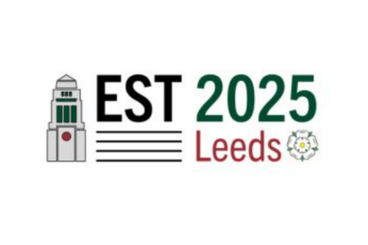
-
Date:
30 JUNE-03 JULY 2025from 9:00 to 17:00 -
Event location: University of Leeds - In presence and online event
-
Type: Dissemination event
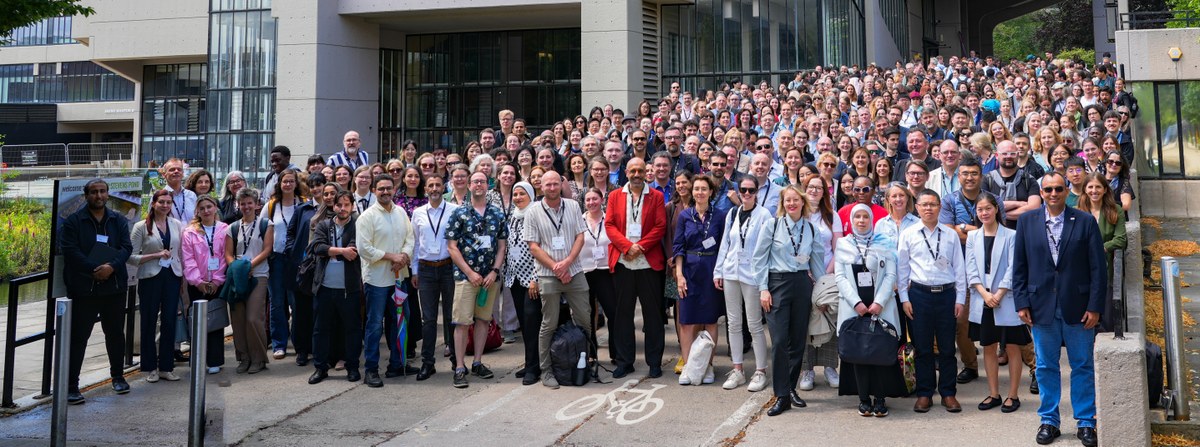
Service-Learning at the 11th EST Congress
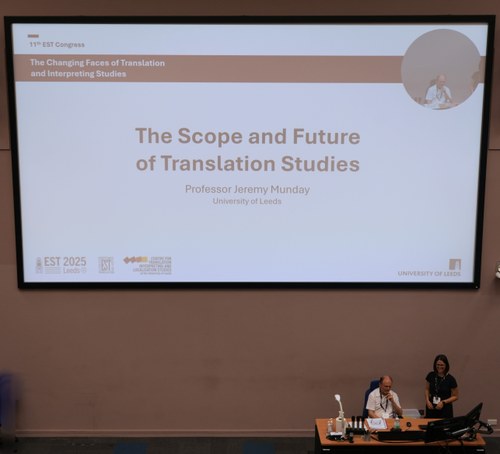
From June 30 to July 3, 2025, the 11th Congress of the European Society for Translation Studies was held at the University of Leeds. The theme of this year’s conference was “The Changing Faces of Translation and Interpreting Studies”. As the world of translation and interpreting evolves, a change driven primarily by the arrival of new technologies, the academic community is gaining a deeper understanding of these disciplines; nonetheless, a persistent gap remains between academic institutions and the translation industry. The goal of the congress was to explore the multifaceted landscape of translation and interpreting studies by bringing together a variety of perspectives, with the hope of finding common ground and fostering future collaborations and connections.
The congress featured several thought-provoking keynote speeches, some of which resonate with the principles of the service-learning methodology. Emeritus Professor Jeremy Munday (University of Leeds) discussed the importance of expanding translation studies to include the “cultural, sociological, historical, ideological, philosophical and ethical contexts” of translation and interpreting in his speech. Embracing such a comprehensive approach to translation studies presents a myriad of challenges, and it necessarily requires a variety of strategies. The IN.TRA project has demonstrated that service-learning is a valid approach for including the cultural, sociological and ethical aspects of translation, encouraging students to go beyond simple notions of translation and reflect on their motivations, as well as the tangible, personal impact of translation and language-related work in community settings.
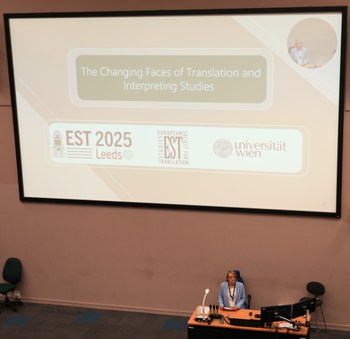
Professor Hanna Risku (University of Vienna), another keynote speaker at the Congress, and her contribution, entitled “Distributed, Collective Enaction: Reframing the Study of Translation and Translation Studies”, focused on a socio-cognitive approach to translation studies so as to emphasize the “material and social embeddedness of translation and interpreting”. Her work examines the expertise of working language professionals, advocating for their practical experiences to be recognized as subjects of academic inquiry. Although rooted in the world of work, there are parallels with service-learning, notably the importance placed on the material and social aspects of language services. While artificial intelligence continues to shape the field of translation, language remains a deeply human and social tool for communication between people around the globe. A service-learning based approach to translation studies pulls the cultural and sociological aspects into the spotlight, pushing educators to redefine translation competences to better prepare graduates for new challenges and opportunities in the industry.
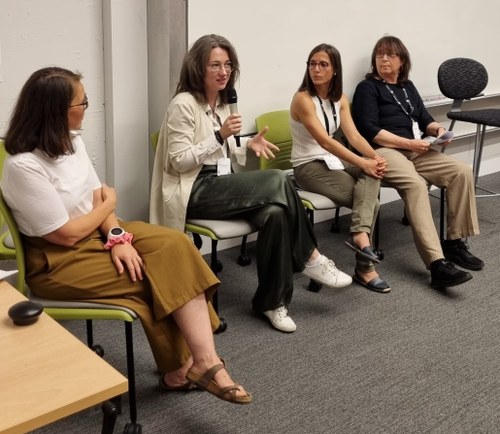
IN.TRA coordinator Patrycja Lidia Stempniewicz also had the chance to present her research on service-learning in translation studies. Her talk, “Rehumanizing translation pedagogy: Insights from a systematic literature review on service-learning in translators’ training”, synthesizes the available literature on service-learning in translation studies and offers reflections on how it can continue to develop. You can read more in the abstract below.
The human dimension in translation and its pedagogy runs the risk of being increasingly eclipsed by a focus on automation and machine-based tools (Prezioso et al. 2024), influencing the pedagogical strategies within translators’ training (Ramírez-Polo and Vargas-Sierra 2023). This trend is visible even from the list of panel titles at this congress, where translation education is almost exclusively linked to technological challenges. While not disregarding the latter, we contend that the education of future translators should be firmly embedded in a pedagogy with human and social aspects at its core. In the search for such an approach, we investigate the potential of service-learning. Inspired by Dewey's (1938) participatory political philosophy and the Kolb’s (1984) experiential learning cycle, service-learning promotes solidarity and social responsibility in students (Bringle and Hatcher 1995). Given the ongoing need to refine professional translation skills (EMT2022; EFFORT 2023) and the crucial role translators play in community engagement (Taibi and Ozolins 2016),the significance of service-learning as a powerful pedagogical tool in translation seems obvious, and yet has received limited attention in the field (Tocaimaza-Hatch 2018). To find out if this is really the case, we conducted a systematic literature review adopting the PRISMA model (Page et al. 2021). Employing the constant comparative method for qualitative data analysis (Glaser & Strauss 1967), our review synthesizes findings from 42 studies (out of an initial set of over 4,000 titles). These highlight the benefits of service-learning in translation education, particularly in enhancing translators’ language, cultural, and interpersonal skills (EMT 2022). While our systematic review shows that further research is needed, particularly adopting stringent methods and focusing on the service provision competence(s), service-learning does appear as a promising didactic framework, which by factoring in professional and interpersonal challenges may help to counteract an exclusive focus on technology in translator education.